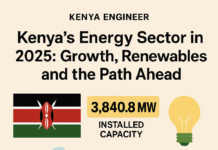Last Updated 1 week ago by Kenya Engineer
The recent announcement from the Institution of Engineers of Kenya (IEK) regarding the court mention, Public Service Commission (PSC) response, and a presidential directive on 10,000 job opportunities for engineers is not just a policy milestone — it is a potential inflection point for the career trajectories of Kenya’s engineering, technologist, technician, and artisan workforce.
The petition seeks a number of reforms: upgrading of entry grades, introduction of risk and non-practising allowances, and a correction of gaps in the Career Progression Guidelines. While PSC had already released career progression guidelines for Engineers, Technicians, and Artisans, the guidelines for Engineering Technologists were omitted — an oversight that IEK is keen to see addressed.
Current State of Career Progression for Artisans, Technicians, Technologists, and Engineers
Membership and Recognition
The IEK’s membership categories reflect the various qualification levels within the profession:
-
Engineering Technicians: Diploma holders in engineering from recognized programs.
-
Engineering Technologists: Degree in Technology in Engineering or its equivalent.
-
Graduate categories also exist for those who have completed studies but are yet to transition into full registration.
However, clear career paths within the public service have been inconsistent, particularly for technologists.
Regulatory Framework
The Engineers Board of Kenya (EBK), established under the Engineers Act 2011, regulates the registration of engineers, consulting firms, and accreditation of engineering education. After 2011, technologists and technicians were initially left out of EBK’s scope, prompting the Engineering Technicians and Technologists Bill 2016, which sought to restore regulation and recognition for these cadres. This marked a turning point for their professional identity, as previously covered in the Kenya Engineer article: Technicians and Technologists finally get recognition.
Internships and Early Career Phase
Graduate engineers are required to undergo the Graduate Engineers Internship Program (GEIP) — a structured 36-month program that provides supervised, practical experience before full professional registration. Many graduates, however, remain “stuck” at graduate status due to limited opportunities for supervision and practice.
Public Service Commission (PSC) Grades
Engineers entering civil service currently start at CSG 10, a grade that IEK argues should be upgraded to CSG 9 in recognition of their training and responsibilities. In addition, allowances such as risk and non-practising allowances, which are common in other professional cadres, are yet to be implemented for engineers in public service.
The Petition and Presidential Action
IEK has petitioned PSC to:
-
Upgrade the entry grade for engineers from CSG 10 to CSG 9.
-
Ensure engineers in civil service access risk and non-practising allowances.
-
Correct the omission of career progression guidelines for Engineering Technologists, which were left out in PSC’s released guidelines despite those for Engineers, Technicians, and Artisans being provided.
-
Support the creation of 10,000 job opportunities for engineers, a proposal that has already reached the Executive Office of the President.
Following the engineers’ peaceful march on 27 August 2025, a petition was presented to the President, who has since directed the Cabinet Secretary for Labour and Social Protection to take appropriate action. The urgency of the matter has been underscored, with instructions that IEK’s proposals be given timely and careful consideration.
EBK’s Role and Proposals
The Engineers Board of Kenya (EBK) has been working on multiple reforms to strengthen the profession:
-
Graduate Internship: Through GEIP, EBK is helping bridge the gap between academic training and professional readiness.
-
Centres of Excellence: EBK has proposed establishing training and innovation hubs, including the Kenya Academy of Engineering Technology and the Kenya School of Engineering.
-
Faster Registration: EBK has reduced the turnaround time for professional engineer registration, from six months to three months, easing the backlog that has frustrated many applicants.
-
Collaboration with PSC: EBK is working with PSC and the State Department for Roads to finalize comprehensive career progression schemes for engineering cadres in the public service.
The missing piece, however, remains the proper recognition of Engineering Technologists in these schemes, something IEK is determined to push through.
Previous Discussions in Kenya Engineer
This issue has been part of the engineering discourse for years:
-
Technicians and Technologists finally get recognition — highlighted how the 2016 Bill re-established regulation for technologists, technicians, craft persons, and artisans.
-
EBK Targets 10,000 Registered Engineers to Meet National Demand — underlined the critical gap between the number of graduate engineers and those who transition into full professional status.
-
Engineering students to undergo three additional years of training — discussed proposals for post-graduation training institutions to strengthen pathways into professional practice.
-
Prof Francis Aduol on his experiences — emphasized how many engineering graduates end up working below their level of training due to the lack of structured career progression.
Together, these discussions illustrate that the current petition is not a sudden development but part of a long struggle to properly structure the engineering profession in Kenya.
Towards a Robust Career Progression Framework
For the engineering ecosystem to thrive, a career progression framework must provide:
-
Clear entry criteria for each cadre (artisans, technicians, technologists, engineers).
-
Defined job groups and grades across the public service, with transparent progression pathways.
-
Experience and competency requirements — including supervised practice, professional interviews, and CPD.
-
Training and mentorship through structured programs like GEIP.
-
Allowances and incentives to retain professionals in public service.
-
Regulatory oversight to protect quality and standards.
-
Leadership and specialization pathways to ensure professionals can grow into senior and specialized roles.
-
Regular review of schemes of service to keep pace with global and industry changes.
Why This Push Matters
By addressing these issues, Kenya will not only strengthen its engineering workforce but also ensure that the infrastructure, industrialization, and manufacturing sectors — all pillars of economic growth — have the technical human capital they need.
The IEK’s efforts, combined with EBK’s regulatory push and the President’s directive, offer a rare opportunity to resolve decades of stagnation in career progression for engineers, technologists, technicians, and artisans. What remains is steadfast implementation, careful oversight, and collaboration across government, regulators, and professional bodies.
Kenya’s future engineers and technologists deserve nothing less.

























